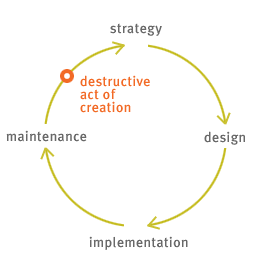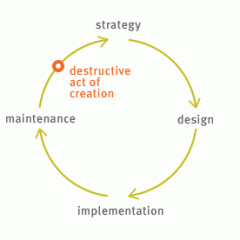As you may have heard, the Department of Justice is looking into opening an antitrust case against the Big 6 publishers and Apple for allegedly colluding to set prices via an agency model which the publishers set the prices for their books in the iBooks store, not Apple. They were then able to put enough pressure on Amazon to coerce it into accepting the agency model as well, which it had previously resisted. This is why you see ebooks being sold on Amazon for $9.99 or more nowadays.
Now, there’s a contingent of publishers and authors who fear change and have grown complacent and dependent on their IP-based, physical distribution model; they tend to see Amazon as an evil corporation out to destroy publishing, bookselling, and writers.
Scott Turow, president of the Authors Guild — does anyone else find the idea of an authors guild disturbing, like modern-day feudalism? some would say the same about the Big 6 publishing houses — recently wrote an open letter speaking out against the antitrust investigation and in defense of the agency model. Quelle surprise! Though it’s ironic to see someone defending big corporations against antitrust investigations who, under normal circumstances (i.e., ones in which his bottom line isn’t directly affected), would probably be in favor of antitrust suits against monopolistic big corporations.
Anyway, Turow types some rather outrageous falsehoods about Amazon. Indie powerhouses Barry Eisler and Joe Konrath1 do a pretty god job of showing how ridiculous Turow’s claims are. Richard Lea summed it up on Twitter with question that makes up the first half of this blogpost title: “Can a bookseller destroy bookselling by selling lots of books?”
I do disagree with Eisler and Konrath on one thing, however, and that is their opposition to the collusion between Apple and the Big 6 publishers. As a libertarian, I don’t have a problem legally speaking with collusion, or price fixing. Without government support, cartels are unsustainable. Of course, believing some practice shouldn’t be illegal doesn’t mean I approve of said practice.
If Apple and the Big 6 want to shaft their customers with higher prices than their customers are willing to pay, then they’re only hurting themselves with lost sales and an increased incentive to engage in piracy. Indie and self-published authors, and Amazon’s imprints, benefit by being able to undercut the Big 6’s prices by an even wider margin. And, though I haven’t looked into the timing of it, the collusion and coercion of Amazon to adopt the agency model probably pushed Amazon to get into publishing itself. So the Big 6 probably just encouraged Amazon to become a direct competitor in the publishing biz (sooner), and let me tell you they are at a distinct disadvantage vis-à -vis Amazon here.
Legacy publishers still depend heavily on paper book sales. And since paper book sales depend so heavily on brick-and-mortar stores, the Big 6 and Turow seek to protect these traditional booksellers from the online bookseller Amazon’s superior competition for as long as they can. They are looking to prop up paper book sales with high ebook prices. That’s what the agency model is all about. It’s their final stand. Of course, if they succeed in imposing the agency model on ebooks over the long-term, I’m sure they’ll eventually throw their brick-and-mortar friends under the bus.
The Big 6 publishers and brick-and-mortar booksellers don’t have a right to their impose their antiquated business model on others by force. But their ability to do so rests in large part on the mistaken notion that authors have a right to be paid for their writing. Do they deserve to be paid? Maybe. Do they have a right to be paid? No. So say I, so say a growing number of libertarians who recognize that ideas cannot be property and copying is not theft, and so says Seth Godin.
In a recent interview with Digital Book World, the writer and creator of the Domino Project — a joint publishing venture with Amazon that he recently wound up — was asked about his advice that authors should give their books away for free and that they should worry more about spreading their message and building a fan base instead of focusing on how to monetize it right away. And how would he respond to writers concerned about their ability to make a living from their writing? Godin’s response:
Who said you have a right to cash money from writing? Poets don’t get paid (often), but there’s no poetry shortage. The future is going to be filled with amateurs, and the truly talented and persistent will make a great living. But the days of journeyman writers who make a good living by the word — over.

I, for one, welcome this development and the freedom that comes with it. Market-driven destructive creation is a good thing; it shakes up entrenched interests that have grown complacent and enables progress. Now authors can easily publish their work and make money without having to win the approval-lottery of myopic gatekeepers.
With the increased competition will come increased innovation and creativity. Mechanisms will develop, and already are developing, to help readers sort the wheat from the chaff. Authors may still get paid, and even make a living off their writing, but they’ll have to do more to earn it because they won’t be able to rely upon a state grant of monopoly privilege and a state-supported oligopolistic industry in order to expropriate money from readers. Some people will feel driven to write even if they aren’t being paid, just as they always have.
Full disclosure: Both men recently made publishing deals with one of Amazon’s new fiction imprints but were extremely successful self-publishers beforehand and are still self-publishing other work. ↩















